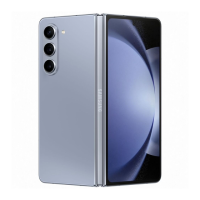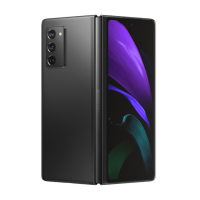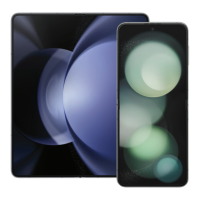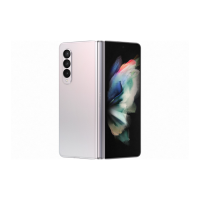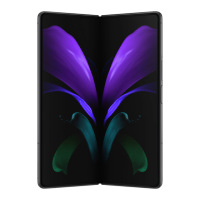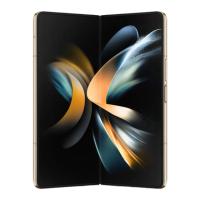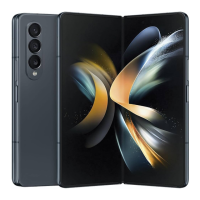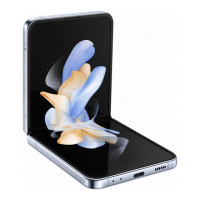Do you have a question about the Samsung Galaxy Z Fold 2 and is the answer not in the manual?
Details the physical components and layout of the device when unfolded.
Details the physical components and layout of the device when folded.
Lists important safety and usage guidelines to prevent damage and ensure proper operation.
Explains the function of physical buttons and on-screen navigation controls.
Provides instructions and precautions for charging the device's battery using wired methods.
Details wireless charging and important safety measures for the process.
Covers quick charging options and sharing battery power with other devices.
Offers advice on conserving battery life and best practices for charging.
Explains SIM card types and guides on installation and activation.
Guides on activating eSIM and managing SIM card settings.
Instructions for turning the device on/off and completing the initial setup process.
Details signing up, signing in, and managing your Samsung account.
Explains dual-screen functionality and app layout changes between screens.
Features for one-handed use, continuing apps, and mirroring the cover screen.
Details touch gestures like tapping, dragging, and pinching for device interaction.
Explains navigation bar buttons and how to hide it using swipe gestures.
Covers managing the home screen, app screen, and switching between them.
Instructions for customizing wallpaper, themes, widgets, and panels on the home screen.
Features for searching content, organizing apps into folders, and moving items.
Explains the taskbar for quick app switching and running multiple apps.
How to use the Edge panel for quick access to apps and features.
Changing screen lock methods, smart lock, widgets, and indicator icons.
Managing notifications, indicator icons, and using quick setting buttons.
Explains device use in Flex mode with automatic layout changes for apps.
Covers keyboard layout, changing input language, and keyboard settings.
Step-by-step guide on how to copy and paste text on the device.
Instructions for downloading apps and managing installed applications.
How to make voice/video calls, use speed dial, and manage contacts.
Steps to create, import, and sync contacts from various sources.
Instructions for composing, sending, and viewing text and voice messages.
Guides on browsing the web, bookmarking, and using secret mode for privacy.
Explains multi-window, split-screen, and pop-up view for multitasking.
How to start and use Bixby through voice commands or text input.
Using Bixby Vision for image recognition, translation, and text extraction.
Features for setting up child-safe environments with usage restrictions and controls.
Managing wellness and fitness goals, tracking progress, and viewing health tips.
How to create, edit, and delete notes using text, handwriting, or drawing.
Information on Samsung Members support and the Samsung Global Goals initiative.
How to access the Galaxy Shop app for product information.
Connecting and managing wearable devices using the Galaxy Wearable app.
Creating and syncing events in the calendar, managing schedules.
Setting reminders, creating, completing, and deleting them for task management.
Using My Files, Clock, and Calculator for basic device operations.
Organizes games and allows changing performance modes for gaming optimization.
Optimizing the gaming environment with priority mode and temperature monitoring.
Managing smart appliances via SmartThings and mirroring screen to TV using Smart View.
Sharing Bluetooth audio with others and listening to music together with Galaxy Buds.
Connecting device to Windows PC for accessing data and notifications.
Steps for connecting device to TV or monitor via HDMI for DeX mode.
Instructions for using Samsung DeX by connecting device to computer via USB.
Setting up Samsung DeX wirelessly with TVs or computers using Wi-Fi.
Managing DeX using external keyboard/mouse or smartphone as touchpad.
Controlling DeX via computer, using screen keyboard, and managing notifications.
Lists and describes various Google applications available on the device.
Basic steps for taking photos and adhering to camera etiquette guidelines.
Adjusting camera settings, zoom, and using different shooting modes for photos.
Using zoom features, locking focus/exposure, and camera button functions.
Explains various options and settings available within different camera shooting modes.
Using the camera effectively when device is folded in Flex mode, including cover screen.
Taking selfies using rear camera and utilizing dual preview screens for composition.
Using photo mode for automatic adjustments and employing shot suggestions for composition.
Applying filters, beauty effects, and using video stabilization and auto-framing.
Recording videos in dual mode and capturing multiple shots/videos with single take.
Capturing portrait photos/videos with blurred backgrounds and applying effects.
Manual control over exposure, ISO, focus, and other settings in Pro mode.
Taking photos in low-light conditions and enhancing food shots with vibrant colors.
Capturing wide scenes with Panorama and recording slow-motion videos.
Recording videos in slow motion and editing the slow-motion sections.
Creating fast-motion videos and customizing camera settings like watermarks and RAW.
Settings for selfies, video stabilization, and advanced video options like HEVC and HDR10+.
Auto HDR, tracking auto-focus, grid lines, location tags, and shooting method settings.
Information on privacy notice, permissions, resetting settings, and camera app support.
Viewing images and videos, creating albums, and grouping similar images.
Viewing images, cropping enlarged images, and using Bixby Vision with photos.
Playing videos, using playback controls, and enhancing video brightness.
Creating albums, stories, syncing images/videos with cloud, and using recycle bin.
Creating AR emojis, short videos, and contact profiles using AR Emoji Studio.
Creating short videos with emojis to use as wallpaper or call backgrounds.
Using AR Emoji Camera with different modes like Scene, Mask, Mirror, and Play.
Creating, using, and deleting custom AR emoji stickers for messages and social networks.
Recording videos with virtual handwriting or drawings using the AR Doodle feature.
Instructions for starting, pausing, finishing recordings, and changing recording modes.
Using Samsung Wallet for payments, identity verification, tickets, and digital keys.
Setting up and making payments using Samsung Pay with registered cards and PIN.
Sharing content via Quick Share, setting device visibility, and sharing via web link.
Methods for capturing screenshots, including key capture and palm swipe.
Instructions for recording the screen, including sound settings and drawing on screen.
Steps for transferring data from a previous device using a USB cable.
Methods for wireless data transfer and backing up/importing data from a computer.
Managing Samsung account and various connections like Wi-Fi, Bluetooth, NFC.
Connecting to Wi-Fi networks, viewing quality, and sharing passwords.
Pairing with Bluetooth devices and sending/receiving data via Bluetooth.
Using NFC for payments and reading product information from NFC tags.
Reducing data usage with Data Saver and making NFC payments.
Selecting apps for mobile data only and using the device as a mobile hotspot.
Customizing connection features, VPN, DNS, Ethernet, and printer settings.
Managing connections to other devices like Buds, tablets, computers, and vehicles.
Setting up custom modes and routines for device automation.
Adjusting ringtones, notification sounds, volumes, and vibration settings.
Enhancing sound quality with Dolby Atmos, Equalizer, and managing separate app sound.
Customizing notifications, light/dark mode, brightness, and eye comfort shield.
Adjusting screen refresh rate, screen layout, zoom, and edge panels.
Changing screen modes (Vivid/Natural) and adjusting display color balance and tones.
Customizing wallpaper, themes, and home screen layout and icons.
Managing screen lock types, smart lock, widgets, and always-on display settings.
Setting up smart lock for trusted locations/devices and configuring always-on display.
Managing lock screen, accounts, app security, privacy, biometrics, and secure Wi-Fi.
Registering and configuring face recognition for unlocking the device.
Registering and optimizing fingerprint recognition for device security.
Using Samsung Pass for identity verification, website/app sign-ins, and managing data.
Protecting private content with Secure Folder and auto-filling personal information.
Setting up Secure Folder, auto-lock conditions, and moving content into it.
Moving content from Secure Folder, adding apps, and syncing accounts within Secure Folder.
Hiding Secure Folder shortcut and uninstalling the app with its content.
Securing Wi-Fi connections by encrypting data and disabling tracking apps.
Protecting specific apps with Secure Wi-Fi and managing location permissions.
Configuring medical info, emergency contacts, SOS, and managing accounts/backups.
Backing up and restoring device data using Samsung Cloud services.
Accessing device labs, gestures, smart suggestions, and Google features.
Setting device actions based on motions like lifting, double-tapping, and palm gestures.
Applying effects during video calls, using auto-framing, and configuring gestures.
Installing and uninstalling a second instance of messenger apps for dual accounts.
Managing device usage, setting screen time goals, and optimizing battery performance.
Checking battery status, managing storage, and optimizing device memory.
Scanning malware, updating software, running diagnostics, and using maintenance mode.
Customizing system settings, managing device languages, keyboards, and reset options.
Configuring accessibility settings and managing software updates for security and features.
Accessing device information such as status, legal, software, and battery details.
Essential precautions for safe and proper device operation, including software and copyright.
Touchscreen visibility, adaptive brightness, FCC approval, and UWB transmitter restrictions.
Explains warning, caution, and notice icons, and precautions regarding device magnets.
Information on supplied items, accessories, and compatibility with the device.
Causes of overheating during charging/use and solutions, including precautions.
Lists scenarios causing overheating during use and actions to take, like software updates.
Advice on stopping use during overheating and avoiding damaging conditions for device longevity.
Introduces accessibility options like TalkBack, gestures, and reading menu for easier use.
Configuring TalkBack settings, customizing gestures, and adding image labels.
Features for keyboard input, audio description, and Bixby Vision accessibility.
Adding voice recordings to labels, display modes, and high contrast themes for visibility.
Adjusting contrast for fonts, keyboard, button shapes, color inversion, and color adjustment.
Adjusting screen colors, reducing motion effects, and dimming the screen for comfort.
Using magnifier, changing pointer, font, and screen zoom for enhanced usability.
Features like Live Transcribe, Live Caption, sound detectors, and hearing aid support.
Setting doorbell detection, hearing aid compatibility, and adapting sound for calls/media.
Muting sounds, adjusting sound balance, and controlling interaction with universal switch.
Registering switches for control and accessing assistive menus via a shortcut icon.
Using cursor control via touch area and controlling the device using voice access.
Restricting device reactions to inputs and adjusting touch and hold delay.
Settings for ignoring repeated touches, auto-action, sticky keys, slow keys, and bounce keys.
Launching accessibility features quickly, setting light notifications, and managing time to take action.
Solutions for device prompts (PIN, PUK) and network or service error messages.
Troubleshooting slow touchscreen response, device freezing, and forcing restarts.
Solutions for microphone issues, sound echoes, poor audio quality, and disconnected networks.
Resolving camera launch errors, poor picture quality, and multimedia file playback issues.
Troubleshooting Bluetooth, screen brightness bar, computer connection, and GPS location.
Addressing data loss, device gaps, storage space, and battery removal information.
Legal notice regarding copyright protection for the manual content.
Lists registered trademarks and acknowledges Dolby Laboratories and Wi-Fi Alliance.
| RAM | 12GB |
|---|---|
| Storage | 256GB/512GB |
| Battery | 4500 mAh |
| Charging | 25W wired, 11W wireless, 4.5W reverse wireless |
| Dimensions (Folded) | 159.2 x 68 x 16.8 mm |
| Dimensions (Unfolded) | 159.2 x 128.2 x 6.9 mm |
| Weight | 282 g |
| SIM | Nano-SIM, eSIM |
| Network | GSM / CDMA / HSPA / EVDO / LTE / 5G |
| Display (Main) | 7.6 inches, 1768 x 2208 pixels, Dynamic AMOLED 2X, 120Hz |
| Display (Cover) | 6.23 inches, 816 x 2260 pixels, Super AMOLED |
| Processor | Qualcomm Snapdragon 865+ |
| Rear Camera | 12 MP (wide, telephoto, ultrawide) |
| Front Camera | 10MP (cover) + 10MP (main) |
| Operating System | Android 10, upgradable to Android 12 |
| Connectivity | Wi-Fi 6, Bluetooth 5.0, NFC |
| Colors | Mystic Black, Mystic Bronze |
